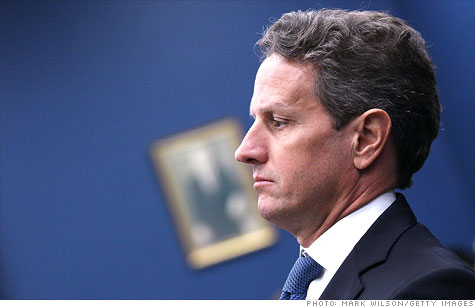
Treasury Secretary Tim Geithner said European leaders need to do more to prevent financial chaos in Europe.
WASHINGTON D.C.(CNNMoney) -- U.S. Treasury Secretary Tim Geithner warned Saturday that the sovereign debt and banking crisis in Europe represents "the most serious risk now confronting the world economy."
In an official statement to the International Monetary Fund, Geithner also discussed the need to both support the U.S. economy in the short term and take steps to lower the nation's long-term deficits.
But his strongest comments were directed at Europe, where the specter of a default by the Greek government has upset financial markets around the world. The nation's long-standing debt problems are threatening to spill over into the European banking system, with possible repercussions for the fragile U.S. economy.
While he praised the actions European leaders have taken so far, Geithner said more needs to be done to create a "firewall against further contagion."
"The threat of cascading default, bank runs, and catastrophic risk must be taken off the table, as otherwise it will undermine all other efforts, both within Europe and globally," the Treasury chief said. "Decisions as to how to conclusively address the region's problems cannot wait until the crisis gets more severe."
Geithner also reiterated his argument that President Obama's recently proposed $447 billion plan to boost hiring and employment could create one million jobs "at a critical moment in the recovery."
At the same time, Geithner reaffirmed the administration's commitment to reduce deficits by more than $3 trillion over 10 years by cutting spending and reforming the nation's tax code.
Geithner's comments came as global finance ministers and central bankers gathered in Washington for the annual meeting of the IMF and the World bank. The meeting takes place against a backdrop of economic gloom and deep anxiety over the sovereign debt and banking crisis in Europe.
Christine Lagarde, the newly appointed managing director of the IMF, noted the grim mood in her opening remarks earlier Friday.
"All across the world, people worry more and more about their futures and their children's futures," she said. "They are looking to us for solutions."
Lagarde urged policymakers in developed nations to take urgent and coordinated action to address what she called a "crisis of confidence" in the global economy.
The U.S. government must act now to reduce long-term deficits while being careful not to hurt the nation's fragile economy by cutting spending too aggressively, she said.
In Europe, Lagarde said countries with unsustainable debts and dim economic prospects must follow through on commitments to reduce deficits and boost growth. At the same time, she called on stronger European economies to "do whatever it takes" to support the weaker members of the European Union.
On Thursday, finance ministers from the Group of 20 major economic powers issued a statement saying that they remain "committed to a strong and coordinated international response to address the renewed challenges facing the global economy."
However, the statement was seen as a disappointment by many investors and commentators who argue that being committed to action and actually taking action are two different things.�![]()
First Published: September 24, 2011: 11:09 AM ET
Source: http://rss.cnn.com/~r/rss/money_topstories/~3/mK-Z-VRnJ4c/index.htm
No comments:
Post a Comment